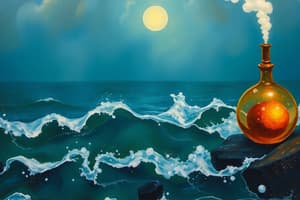Podcast
Questions and Answers
What is the average salinity of seawater?
What is the average salinity of seawater?
- 3%
- 2.5%
- 5%
- 3.5% (correct)
How do changes in salinity in the ocean occur?
How do changes in salinity in the ocean occur?
- Only due to human activities
- Exclusively due to industrial water use
- Mainly due to plastic pollution
- Primarily due to natural processes like evaporation and precipitation (correct)
What is a critical factor influenced by salinity in oceans?
What is a critical factor influenced by salinity in oceans?
- Density of seawater (correct)
- Number of marine pollutants
- Land temperature
- Amount of plastic pollution
Which of the following is a common marine pollutant mentioned in the text?
Which of the following is a common marine pollutant mentioned in the text?
What is the impact of marine pollutants on seawater quality?
What is the impact of marine pollutants on seawater quality?
How do human activities influence ocean salinity?
How do human activities influence ocean salinity?
What is the primary consequence of oil spills on ocean ecosystems?
What is the primary consequence of oil spills on ocean ecosystems?
How can eutrophication affect marine life?
How can eutrophication affect marine life?
Which process is crucial for regulating atmospheric carbon dioxide levels?
Which process is crucial for regulating atmospheric carbon dioxide levels?
What is the primary effect of microplastics on the marine food chain?
What is the primary effect of microplastics on the marine food chain?
Why is the ocean considered an essential reservoir of phosphorus?
Why is the ocean considered an essential reservoir of phosphorus?
Which human activity directly contributes to nitrogen entering the oceans?
Which human activity directly contributes to nitrogen entering the oceans?
Study Notes
Ocean Chemistry: Exploring Salinity, Pollutants, and Nutrient Cycles
Our oceans are vast and complex ecosystems, shaped by a delicate interplay of chemical processes that have been underway for millions of years. In this article, we'll delve into three essential aspects of ocean chemistry: salinity, marine pollutants, and nutrient cycles.
Salinity
Salinity is the concentration of dissolved salts in seawater, with an average salinity of about 3.5% (or approximately 35 grams of salt per kilogram of seawater). This saltiness is a critical factor in ocean temperature dynamics, water density, and buoyancy. Salinity influences both ocean currents and the ability of creatures to live in various aquatic environments.
Changes in salinity can be attributed to natural processes like evaporation and precipitation, but human activities like irrigation and industrial water use can also impact ocean salinity. For example, the world's largest ocean, the Pacific, has seen declining salinity in some regions due to increased freshwater input from rivers and human water use.
Marine Pollutants
Marine pollutants are substances that degrade the quality of seawater, harming aquatic life and impacting human health. Some common marine pollutants include:
-
Plastic debris: Plastic pollution in the ocean is a well-known issue, affecting marine life at various trophic levels. Microplastics, in particular, are small bits of plastic that can be ingested by plankton, then by larger creatures, and eventually by humans as well.
-
Oil spills: Oil spills pose a significant threat to ocean ecosystems, leading to the death of marine animals and the contamination of seawater. They can also disrupt the natural nutrient cycles.
-
Nutrients from agriculture and wastewater: Fertilizers, manure, and sewage contain nitrogen, phosphorus, and other nutrients that can enter oceans and cause eutrophication. Eutrophication leads to excessive plant growth, oxygen depletion in the water, and the death of marine life.
To mitigate the effects of these pollutants, a combination of efforts is needed, including reducing plastic production, improving waste management, and ensuring proper disposal of hazardous materials.
Nutrient Cycles
Nutrient cycles in the ocean are complex and interconnected processes that facilitate the exchange of essential elements like carbon, nitrogen, and phosphorus among the various components of the ecosystem. These cycles support the growth of marine life, from tiny phytoplankton to large marine mammals.
-
Carbon cycle: Carbon is exchanged among the atmosphere, oceans, and land through photosynthesis, respiration, and dissolution. The ocean plays a crucial role in regulating atmospheric carbon dioxide levels and absorbing excess carbon from the atmosphere.
-
Nitrogen cycle: Nitrogen circulates between the atmosphere, oceans, and land through various processes, including nitrogen fixation, anaerobic and aerobic respiration, and denitrification. The ocean plays a vital role in the nitrogen cycle by supporting diverse ecosystems and by serving as a source of fixed nitrogen for the atmosphere.
-
Phosphorus cycle: Phosphorus moves between the oceans, land, and atmosphere through processes like weathering, runoff, and sedimentation. The ocean is an essential reservoir of phosphorus and plays a vital role in supporting primary production and sustaining marine life.
Understanding these nutrient cycles is essential for predicting future changes in ocean ecosystems and for developing effective strategies to mitigate the effects of human activities on ocean health.
Conclusion
In this article, we explored three essential aspects of ocean chemistry: salinity, marine pollutants, and nutrient cycles. These topics are interconnected, and understanding them is crucial for developing effective strategies to protect our oceans and the diverse ecosystems they support. By reducing pollution, protecting the ocean's natural processes, and promoting sustainable practices, we can ensure the long-term health of our oceans and the life that depends on them.
Studying That Suits You
Use AI to generate personalized quizzes and flashcards to suit your learning preferences.
Description
Test your knowledge of ocean chemistry by exploring topics such as salinity, marine pollutants like plastic debris and oil spills, and nutrient cycles including carbon, nitrogen, and phosphorus cycles. Learn about the impact of human activities on ocean health and ways to protect these vital ecosystems.




